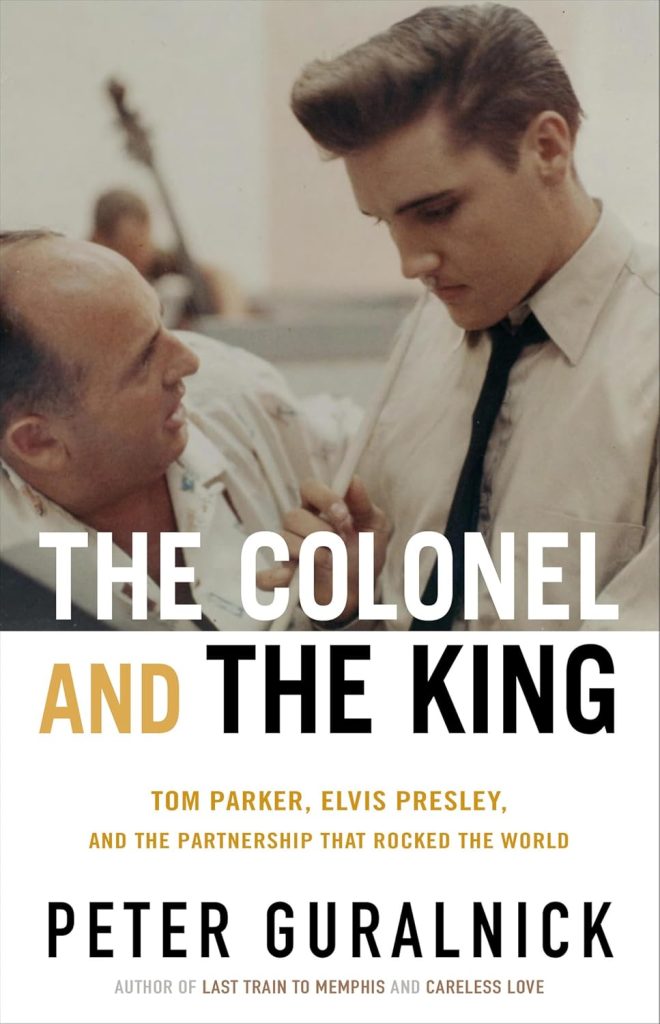“The Colonel and the King” Review: Peter Guralnick’s book provides stark contrast to negative public perception of how Colonel Parker treated Elvis
After the release of the 2022 ELVIS movie, which portrayed Colonel Parker as an evil villain, Elvis Presley’s friend, Jerry Schilling, was quoted as saying: “I hope Peter Guralnick [famed author of the acclaimed 2-part Elvis biography] can do a book on the Colonel some day, since he got to know the Colonel quite well.”
It seemed a bit contradictory since Schilling was a vocal supporter of the blockbuster ELVIS film directed by Baz Luhrmann. But that didn’t mean he agreed with everything portrayed in the film. In fact, as I reported in my 2023 book, Fact vs Fiction in the 2022 ELVIS Movie, Schilling refuted the theory that the Colonel was to blame for Presley’s demise. He stated that the Colonel “was doing what he thought was best.” The Colonel “was controlling, he was manipulative, but he was honest and hardworking, and he had a lot of polish. No doubt about it,” Schilling explained.
It’s clear that the character of Colonel Parker portrayed in the film, was an over-the-top exaggerated version of the actual person. To set the record straight, there needed to be a fair and balanced analysis of Parker and his relationship with Elvis, which is what we get in Guralnick’s new 611-page book, The Colonel and The King.
One of the most important takeaways from the book is the undisputed fact that managing an entertainment artist is hard work. There are so many negotiations and power plays that go on behind the scenes that the general public has no knowledge of. And it is through these agreements and contracts that a manager can make or break a performer’s career.
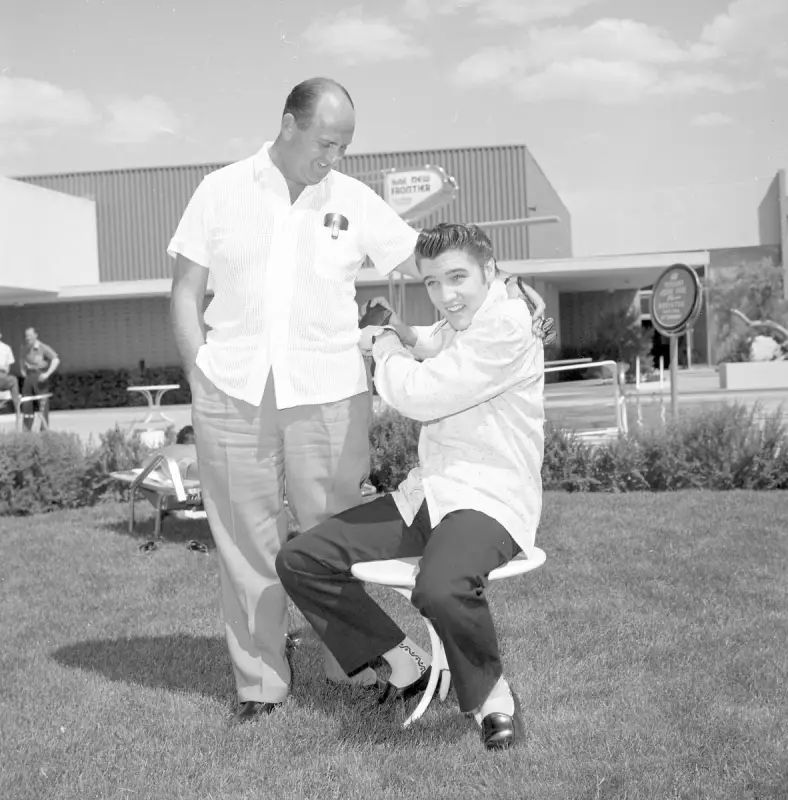
That is why the second half of the book, showcasing letters that Colonel Parker wrote to various people including Elvis, executives at the RCA record label, and other people involved in Presley’s entertainment career, is so important. While fans have long held negative views of things that the Colonel did in the later years’ of Elvis’ career, there is no debating that the decisions that Parker made in the early days of working with Presley enabled him to rise to superstar status.
The counter argument is always that Elvis had so much talent that anybody could have guided him to the top. But, as we see in the letters, it was Parker who took the reigns to get Elvis his first appearances on national television (letter dated December 16, 1955), it was Parker who held fast to his goal of getting Presley his own starring role in a feature film after being offered an easier deal for Elvis to appear in a movie short (letter dated November 14, 1955), it was Parker who found a way to pay Sam Phillips his over-the-top fee to get Elvis out of his Sun Records contract when other studio heads declined, and it was Parker who had the gravitas to advise and educate the inexperienced Elvis when he was showing unprofessional behavior to tour sponsors in his early days.
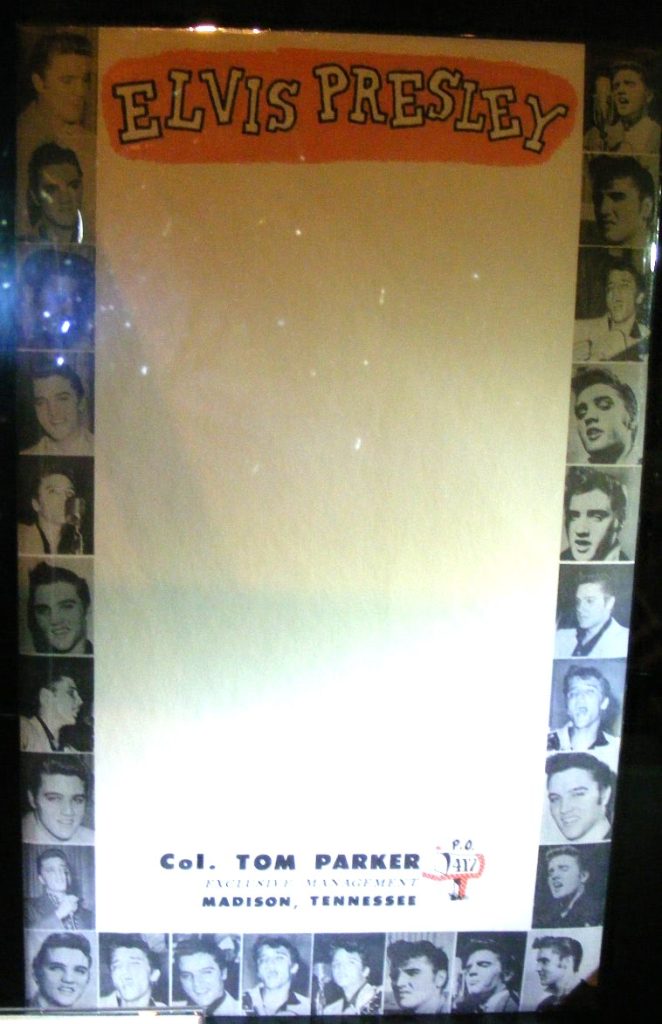
As Parker wrote to Presley’s then-manager, Bob Neal, in a letter dated August 22, 1955, after a show promoter complained that Elvis and Bill Black indulged in some “smutty comedy” during the show:
“ELVIS has great talents and he does not have to resort to smutty comedy to sell his attractions… I think the most important thing is that he needs guidance. He is young, inexperienced, and it takes a lot more than a couple of hot records in a certain territory to become a big name artist, level-headed, courteous, and carry the responsibility that goes with being a star as ELVIS wants to be.”
The mishandling of any one of these issues could have left Elvis a regional act for the rest of his life, or maybe even a one-hit wonder. Even after Parker orchestrated the RCA record deal for Elvis in November 1955, things did not get off to a smooth start. RCA believed that Elvis would shift to become a pop star, singing more mainstream songs they chose, while Parker defended his artist insisting that they release “Heartbreak Hotel” as Presley’s first single on the label, as Elvis wanted.
In the ELVIS movie, as well as many fan’s minds, Parker was, in a sense, a show business predator that found his victim in Elvis, or even his “mark” – someone he could manipulate and scam to make millions off of. However, in the first half of the book, where Guralnick presents Elvis and The Colonel’s relationship in detail, as well as Parker’s biography before he met Elvis, he documents how Elvis was not Parker’s first artist.
In fact, the Colonel had, what you could call, a dry run before Elvis, with country star Eddy Arnold, who he managed from 1945 to 1953. Parker would lead Arnold’s career in the same fashion as he would later do with Elvis, by securing him a record contract with RCA, getting him starring roles in his own movies, and booking him in Las Vegas (“the first hillbilly act to headline” there). As a result, Arnold became one of the most popular country stars of the time. Between November 1947 and November 1948, “Eddy Arnold topped the country charts for 53 weeks in a row, a figure never approached, let alone rivaled, in any popular music charts to this day,” Guralnick explains.
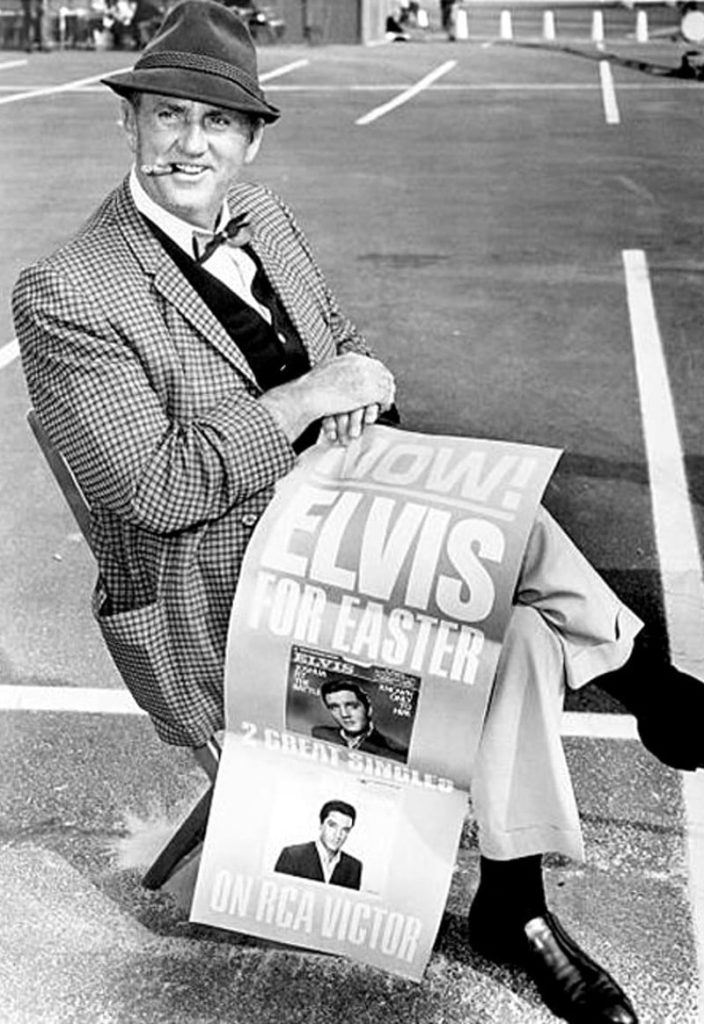
Most entertainment managers have multiple clients. But starting with Arnold, Colonel Parker displayed his attention to detail by doing everything for his one and only client. “He advanced the show, planned all the routes, wrote all the ad copy, sold programs and souvenirs at the shows, and settled all the box-office receipts. He was like a tornado…”
Parker’s devotion not only to promoting his client, but also to serve as a spokesperson by inserting himself front and center in the promotion strategy, may possibly be traced back to an unfulfilled desire of Parker’s to be a performer himself. As he worked his way up in the carnival show circuit in the mid-1940s, he surprisingly became part of the act when he performed in a comedic skit in singer Ernest Tubb’s show.
One statement made by Nelle Poe, a performer in Tubb’s show who knew Parker at this time, may explain this. “He [Parker] always said, to me, ‘I’m going to Hollywood someday,'” Poe said.
Accepting the fact that he’d find more success managing entertainers than being one, Parker had another dry run before Elvis when he also briefly tried to promote young singer, Tommy Sands. While Sands was not successful in his initial recording career at RCA, Parker still looked out for him even when he was managing Elvis. Parker recommended Sands for the lead role in the televised play inspired by Presley’s life, The Singin’ Idol, which gave him his big break in 1957. As reported in Alanna Nash’s book, The Colonel, Sands would send a letter to be read at Parker’s memorial service which “thanked the Colonel for making his dreams come true.”

Guralnick addresses many of the myths surrounding Parker including the 50 percent myth. The belief that Parker took 50 percent of Elvis’ earnings throughout most of his career is not true. This agreement only took place starting in 1976. Guralnick confirms that Parker only charged the 50% fee once before Elvis died. It was for the 1977 CBS television special.
“In addition to the $1 million-plus guaranteed proceeds from the tour,” Guralnick wrote, “Colonel and Elvis would divide the $750,000 fee for the special 50-50, the first, and as it turned out only, time Colonel actually applied the full-partnership agreement they had signed more than a year before. (Despite the agreement, the tour money was divided two-thirds/one-third).”
Regarding the perception that Parker worked Elvis to death in Las Vegas in the 1970s, Guralnick stated in a recent interview on NPR’s Fresh Air: “You can see all through the last few years Colonel trying to get Elvis off the road, not on the road,” Guralnick explained. “It was not Colonel who was putting him on the road. It was Elvis’ need for money. I mean, there was always a crisis. You know, Graceland was – had to be remortgaged. Taxes needed to be paid. You can see this in the letters that Elvis’ father, Vernon, writes to Colonel just begging Colonel to come up with some money. Surely, you can come up with some money from RCA.”
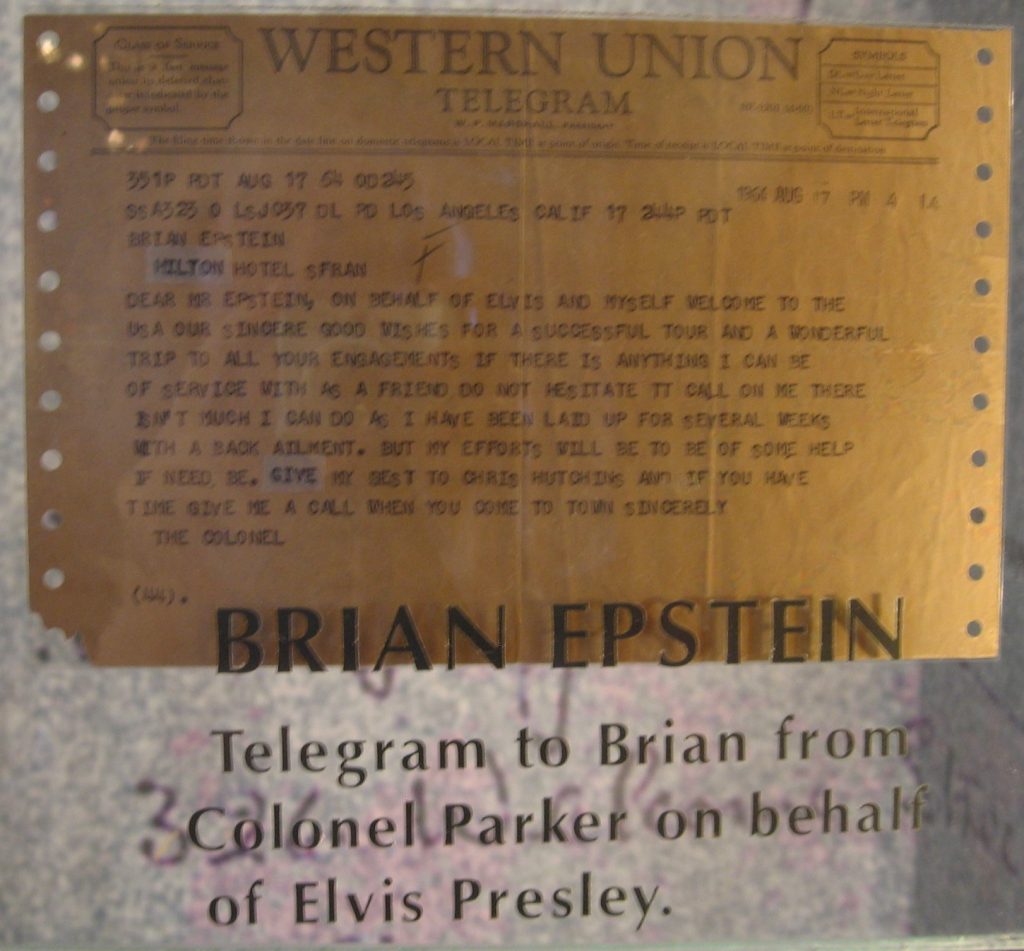
As I explained in my book, ELVIS and The Beatles, Parker was known for freely giving advice to other entertainers and even their managers. In 1964, Parker reached out to The Beatles’ manager, Brian Epstein, and offered him help with the Beatles first US tour (see telegram pictured on right).
A letter from The Colonel to Brian Epstein dated September 10, 1965 is included in the book. It was Colonel’s response to Brian thanking him for arranging the now legendary meeting between Elvis and The Beatles in August 1965. In the letter, Colonel says: “You owe me no thanks, for friends don’t have to thank each other.”
While some people who knew Parker did not care for him, on the other hand, he was a father figure, not only to Elvis, but to many others as you’ll learn in Guralnick’s book.
Guralnick addresses the negative perception of the Colonel’s management of Elvis by urging readers to “Surrender yourself, if you can, to their unremediated dream, set aside the myths that have grown up around them both, and give yourself over to an empathetic (and I don’t mean credulous or uncritical, just human) reading of history.”
This reviewer concurs with that statement. Instead of seeing Parker’s relationship with Elvis as an evil all-or-nothing judgment of deeds as portrayed in the 2022 ELVIS movie, Guralnick’s book is proof that the circumstances between Elvis and Parker were not simply black and white. There is much more gray area to take into account for “the partnership that rocked the world.”
***
CLICK HERE to order the book on Amazon
CLICK HERE to order the Kindle ebook
CLICK HERE to order the audiobook
[affiliate links]
This review was written by the Elvis News Examiner, Trina Young. She is the author of 4 Elvis books, including her latest, ELVIS: The Army Years Uncovered. Read a free excerpt at ElvisBiography.net.
Read her review of Lisa Marie’s book, From Here to the Great Unknown
Watch: These four Lisa Marie Presley duets with her father, Elvis Presley, will make you cry
NOTE: COMMENT SECTION IS AT BOTTOM OF PAGE
Disclaimer: Most products mentioned contain affiliate links. This website makes very small earnings when you buy a product through one of the links. These earnings help with the maintenance of this website. Your support is appreciated!

